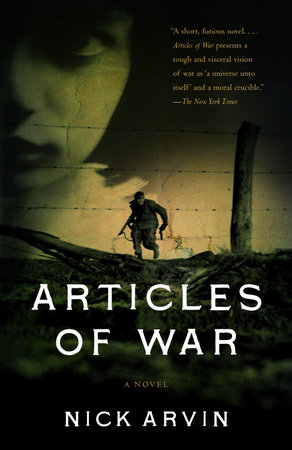Articles of War Reader’s Guide
By Nick Arvin


1. In what ways does Articles of War differ from most literary and cinematic depictions of war? What is the value of writing about war not from a heroic point of view but from the perspective of someone who is paralyzed by fear? What does the novel tell us about the essential nature of war and what it does to those who are asked to engage in battle?
2. What does George Tilson’s nickname, Heck, reveal about his character? In what sense is his refusal to curse a harbinger of his actions?
3. Why does Heck run away from Claire instead of making love to her? How does this turning away affect his later actions? What is the symbolic significance that the encounter takes place in a cave?
4. Should Heck be considered a coward, a young man unsure of himself, or a victim of the stresses of war? At what moments in the novel does he make cowardly decisions? At what points does he demonstrate bravery?
5. When he is at the hospital, Heck is so “mired in his own problems” that “the men around him had remained more or less indistinguishable” [p. 81]. Why doesn’t Heck feel a greater sense of camaraderie with his fellow soldiers? How does this lack of a bond influence his behavior during combat? Why doesn’t he seem to be aware of or committed to the purpose of the war?
6. Why does Conlee order Heck to join the firing squad executing the deserter Private Eddie D. Slovik? Is he trying to teach him a lesson, or does he want to punish him for his cowardice? In what ways is it poetic justice for Heck to execute a solider for failing to do his duty? How does the experience affect Heck?
7. The sergeant overseeing the execution of Slovik tells the men who are to shoot him that “the responsibility for this decision lay with a higher authority, and this authority was not theirs to question. Theirs was to carry out orders to the best of their ability” [p. 159]. How does this statement echo the defense of Nazi war criminals like Adolf Eichmann who said that they were simply following orders? Under what circumstances should soldiers question or disobey orders?
8. The narrator tells us that after the execution, Heck returned to battle and found that he “had no fear–or at least he could very easily control himself in spite of it–and fought reasonably well until the end of the war. He didn’t understand this change, did not want to understand it, and took no pride in it” [p. 171]. How can this change be explained? Why doesn’t Heck want to understand it or take any pride in it?
9. After the execution, Heck “tried to move himself toward what had been in the mind of the man under the hood in the moment before he died, the moment when the last heartbeat was heard faintly in the doctor’s stethoscope. But he had no access to imagination and could conceive only emptiness” [p. 169]. What does the narrator mean when he says that Heck has “no access to imagination”? Is his lack of imagination a kind of moral failure? What is the value of Arvin’s ability to imagine both the experience of war and the consciousnesses of those who are thrust into it?
10. Albert tells Heck, “War makes thieves and liars of everyone. Dishonor is everywhere. People will do anything–loot a neighbor’s home, murder a grandmother–anything they can think of to help them live a day or two longer. And people are stupid. . . . One or two people are manageably stupid. A handful of people are, collectively, dumb as your average dog. A mob: stupid as an insect. Armies, nations: stupidest things on this earth” [p. 26]. Is this an accurate view of human beings and how they behave during wartime?
11. The author’s note reveals that there was a real Private Eddie D. Slovik who was executed for desertion on January 31, 1945. Why didn’t Arvin make Slovik, who on the surface might seem a more interesting character, the protagonist of his novel? Why focus on Heck instead? In what ways might Heck’s story be more representative than Slovik’s? The author’s note reveals that there was a real Private Eddie D. Slovik who was executed for desertion on January 31, 1945. Why didn’t Arvin make Slovik, who on the surface might seem a more interesting character, the protagonist of his novel? Why focus on Heck instead? In what ways might Heck’s story be more representative than Slovik’s?
12. How might Heck’s life unfold after the novel ends? Is it likely that he will keep the baby? What effect might raising a child have on him? Why has Arvin chosen to end the novel in this way?
Just for joining you’ll get personalized recommendations on your dashboard daily and features only for members.
Find Out More Join Now Sign In